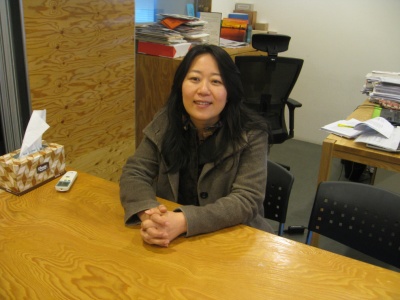
Nowadays, most people in Korean society are familiar with the concept of social enterprise and no child being left alone in an empty home. However, 10 years ago when social enterprise was a quite new notion in Korea, only a few were aware of such ideas. Twenty years ago, not every child was properly cared for when their parents were at work.
In the midst of this social atmosphere, there was a woman who tried to change Korea’s poor public welfare. Lee Eun-ae (’90, Social Welfare) has worked to pave the way of successful social welfare in Korea ever since she was a college student.
“I especially felt responsible for the working-class women compared to the other social classes,” Lee said. “Although most of them were about my age, they lived totally different lives from mine.”
During her senior year, there was a tragic accident that led her into the problem of childcare. Two children were killed in a locked room by fire while their parents were at work. Since there was no childcare center near their home, the parents locked the room from the outside to keep their children from strangers or other possible hazards. After hearing about this tragedy, Lee decided to work for children who are not under the care provided by daycare centers.
“Up until now, this tragedy still remains inside my head. I was shocked that children were locked in room,” Lee said. “It was just because there was no daycare center in the area.”
Since then, Lee started volunteering with a few university students in a small daycare center located in Ansan, where many of the residents were working-class. She felt a gap between theories and reality. In the late 80s, Korean society barely had a concept about child welfare. With this poor situation, children grew up in very violent ways and childcare centers lacked.
Lee and her friends studied to mend the poor condition of child welfare in Korea. They searched child welfare studies in other western countries and changed the methods to fit into Korean society and applied these to their center. For example, they gave children the chance to release their anger by crying, raging and yelling through acting in various plays. Such unique experiences changed those children little by little.
“There was a 3-year-old boy with no facial expressions who had been punished by his father after,” Lee said.
“Whenever I hugged him, he held me tight and at the same time he scratched my back with his nails because of his bad memory of adults. But after a few years, the boy began to trust us and smile.”
Furthermore, Lee worked hard with her friends to enact a law for the welfare of children of working-class mothers in Korea.
While she was working for child welfare, the 1997 Asian financial crisis, known in Korea as the IMF, broke out. Many families were affected and became destitute. As a result, some children were abandoned. To solve this problem, Lee thought that there should be workplaces where parents could work without worrying about their children.
Therefore, she started to look for ideal workplaces for the parents who lost their jobs. While searching through European studies, Lee came across the concept of social enterprise, which in part aims to make profit while following certain social morals.
Lee remembers when she first found out about the concept of social enterprise.
“When I found about social enterprise in European studies, I felt as if this was what I had been looking for,” Lee said.
In 2003, Lee founded an organization named “Work Together Foundation” with other people interested in social enterprise. Social enterprise is a company which makes profits but values more social morals more than other ordinary companies. Work Together Foundation is a foundation that supports people who want to start a social enterprise. Up until then, social enterprise was very new in Korea. Lee started to introduce the notion of social enterprise through TV program. With her efforts, the law concerning social enterprise and cooperative association was finally enacted in 2006.
Five years later, the current Seoul city mayor, Park Won-soon, realized the importance of social enterprise and founded the Seoul Social Economic Center (SSEC) as a part of his plan to help social enterprises thrive in Korean society. SSEC’s goal is to help various social enterprises work together and communicate well each other.
Appreciating her accomplishments, Park asked Lee to lead the SSEC as the president and the CEO.
“Sometimes, it’s harder to work in the SSEC than a private organization,” Lee said. “You have to show your achievement indirectly by making small start-ups thrive, but it’s worthwhile when seeing small start-ups grow big.”
Lee also has a message for Ewha students who struggle to get a job in major companies.
“I know many students want to be employed by well-known companies, but when they are accepted to these companies, they won’t get fulfillment as they had expected,” Lee said. “I think the university years are the right time for Ewha students to experience and try something new and become future leaders.”
Yoon Hye-joon
hajun1237@ewhain.net

